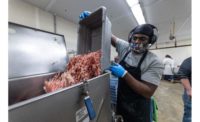In a normal business environment, Micro Summit Processors’ slaughter services are booked out about three weeks in advance. That suits owner Patrick Robinette just fine. He founded the USDA-inspected operation, located in Micro, N.C., to process beef for his own business, Harris-Robinette Beef, as well as for local producers. But we are not in a normal time, not with the Coronavirus still raging through the country and throwing the meat processing industry into disarray. What is the wait time for slaughtering now?
“We are literally booking for animals who aren’t alive yet, in some cases,” Robinette says.
Micro Summit Processors’ employees have worked tirelessly to process beef, pork, lamb and goat that their farmer customers bring. That meat is in turn used for a variety of purposes. Some customers sell their products at farmers’ markets, and others sell to independent grocers. Some supply to restaurants, and an increasing number have developed e-commerce abilities to reach customers across the country.
“We get everybody from five cows all the way up to several hundred. We have a lamb processor, and we will run 250 ewes through this facility for her every year,” he adds. Along with its existing clientele, Micro Summit processors has added new farmers who typically send their animals to one of the larger slaughter plants in the area. As the big plants have shut down or reduced their capacity because of COVID-19 outbreaks, Micro Summit Processors has become a popular alternative.
“We’re a 17,000-square-foot facility. It’s sized to do 600 hogs a day or 100 cattle a day. We are a tremendous asset to this current situation,” Robinette explains.
Robinette saw the potential disruptions that COVID could cause back in February, when isolated cases started being detected in North Carolina. He immediately met with his 11 employees and told them what the potential risks were, and what the company was going to do to make the facility as safe as possible.
“As it started progressing along, we kept getting more education; as we learned something, we gave the information to them,” he says.
Employees are met at the door for a temperature check, and they sanitize their hands before they touch so much as a door handle. On top of that, someone in the company’s office staff will meet with each employee to see how they are feeling each day.
“We know that you can hide a fever or hide any wheezing or cough, but you can’t hide it if you’re having a conversation,” Robinette says.
One problem is that some of the company’s employees have relatives who work at other processing plants that have had COVID outbreaks. Robinette didn’t lay down any rules about his team’s off-hours behavior, but he has asked them to consider their families and their fellow employees. One employee has a sister who lives five miles away and works at another meat plant. They haven’t met face-to-face since March. That’s just one example of the personal responsibility that each employee has demonstrated.
With the demand for Micro Summit Processors’ services at an all-time high, Robinette has taken the unusual step of hiring new employees to increase its capabilities. The company expanded its workforce from 11 to 16 employees. It was something that he wanted to do for some time, but it took a while to determine a course of action that didn’t put any of his current workforce in jeopardy by exposing them to someone who was sick.
Robinette touts his company’s culture that removes the fear of calling off work for illness. That fear has contributed to some of the COVID outbreaks that have affected operations at other meat plants. If one of his employees shows any signs of illness or is exposed to someone with COVID-19, they are off work for two weeks but are not docked any pay or vacation days.
“Since the day we opened, we have told our employees that you’re somebody, you’re part of a family,” Robinette explains. “We are all in this world together, and we give them personal ownership in the operation. We’re willing to sacrifice lowering our productivity for the greater good of the whole facility.”








